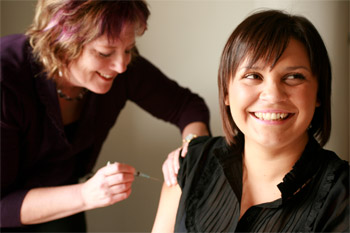Hiranthi Perera Human Papillomavirus (HPV) Interview

Hiranthi Perera Human Papillomavirus (HPV) Interview
Before you get romantic this Valentine's Day it's important to keep in mind that both men and women can be exposed to human papillomavirus (HPV) through sex – even if you have used a condom, have only had one sexual partner or only had sex once.
PapScreen Victoria manager Hiranthi Perera said: 'HPV is sometimes called the -common cold' of sexually transmitted infections, affecting four out of five people at some point in their lives. While the virus usually clears from the body over time, some types of HPV can cause cancer in both women and men."
HPV vaccination for males and females protects against two high-risk types of HPV, and is usually given at the age of 12-13 as it is most effective before sexual activity has commenced.
Men and women are still at risk of HPV even if they haven't had sex for a long time, been with one partner or had the HPV vaccine.
There's no treatment for HPV but the virus can develop into cervical, vaginal and vulva cancers for women; penile cancers for men and genital warts, throat and anal cancers impacting both sexes.
'The best protection for women is two-yearly Pap tests because this is the only way to look for abnormal changes to the cells on the cervix, which if left undetected and untreated, could develop into cervical cancer," said Ms Perera.
Newly released data shows that over a third of Victorian women aged 20 to 69 years aren't participating in two-yearly Pap tests as recommended under the national guidelines.*
'Ninety per cent of cervical cancer cases could be avoided with regular screening. I encourage all women who are due to make an appointment for a quick and simple Pap test today," Ms Perera said.
To find a Pap test provider in your local area, visit www.papscreen.org.au and enter your postcode or suburb into the search engine.
*Victorian Cervical Cytology Registry. Statistical Report 2013.
Interview with Hiranthi Perera, Manager of PapScreen
Question: What is human papillomavirus (HPV)?
Hiranthi Perera: HPV stands for human papillomavirus. The virus is sometimes called the -common cold' of sexual activity– affecting four out of five men and women during some point in their lives.
Question: How are we exposed to human papillomavirus (HPV)?
Hiranthi Perera: The virus is spread through genital-skin to genital-skin contact during sexual activity, via tiny breaks in the skin.
Condoms offer some but not total protection from HPV, as they don't cover all of the genital skin. They do offer protection from many other sexually transmitted infections though, and help prevent unwanted pregnancy.
You can be exposed to HPV the first time sexual activity occurs, from only one sexual partner.
Question: What are the symptoms for human papillomavirus (HPV)?
Hiranthi Perera: Genital HPV infections usually cause no symptoms and usually go away after a year or so, however HPV can cause genital warts.
Question: How is human papillomavirus (HPV) treated?
Hiranthi Perera: There is currently no treatment for HPV.
In most cases the immune system clears HPV from the body naturally over time and has no long-lasting effects.
Most people with HPV have no symptoms and will never know they have it. For women, having regular Pap tests once they become sexually active is the only way to detect abnormal cells on the cervix caused by HPV.
Question: What cancers can be caused by human papillomavirus (HPV)?
Hiranthi Perera: Persistent HPV infection can cause abnormal cells to develop on the cervix, which may develop into cervical cancer, usually over many years, if they remain untreated. Although cervical cancer is the most common type of cancer caused by HPV, persistent infection is also known to cause other cancers affecting men and women, including penile, anal, vulval, vaginal and mouth/throat.
Question: How can we monitor human papillomavirus (HPV)?
Hiranthi Perera: There can be a long interval between being infected with HPV, the development of abnormal cells on the cervix and the development of cervical cancer. The best way for women to monitor HPV infection is to have a Pap test every two years, even after the HPV vaccine. Currently there is no way to know if a male has HPV.
Question: Is there a way to prevent HPV?
Hiranthi Perera: The HPV vaccine called Gardasil protects against the two-high-risk HPV types (types 16 and 18), which cause 70% of cervical cancers in women and 90% of all HPV-related cancers in men. It also protects against two low-risk HPV types (types 6 and 11), which cause 90% of genital warts.
The vaccine is recommended for 12 and 13-year-olds.
For more information on HPV and the vaccine, go to www.hpvvaccine.org.au
Question: What is a PapScreen?
Hiranthi Perera: The Pap test is a quick and simple screening test which can be performed by your doctor and some nurses. Pap tests check for changes to cells on the cervix that if left undetected and untreated may lead to cervical cancer.
PapScreen Victoria recommends all women aged 18 to70 who have ever been sexually active have a Pap test every two years. Regular Pap tests are recommended even after the HPV vaccine.
The early stages of cervical cancer usually have no symptoms, and can only be detected as a result of a Pap test.
Find out more about Pap tests at www.papscreen.org.au
Question: Can both men and women have a Pap test?
Hiranthi Perera: No, Pap tests are only for females.
Interview by Brooke Hunter
MORE



